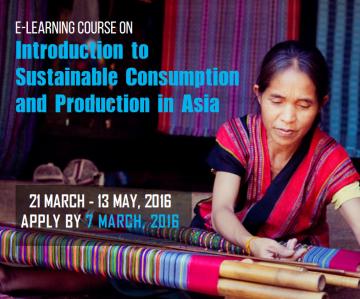
Transitioning towards Sustainable Consumption and Production (SCP) is key to achieving the 2030 Sustainable Agenda. The course “Introduction to SCP in Asia” aims to provide policy makers and other stakeholders with an introduction to SCP, as an approach to enabling sustainable societies in Asia.
The third edition of course is taking place 21 March – 13 May, 2016. The course is developed jointly by the United Nations Institute for Training and Research (UNITAR) and the United Nations Environment Programme (UNEP) and delivered within the framework of the SWITCH-Asia Programme of the European Union.
Participation in the course requires only basic internet connection and a total of 32 learning hours over an 8-week period (4 hours per week). For more information on the course structure, methodology and learning objectives, please consult the course flyer.
With support from the UNEP SWITCH-Asia Project, a limited number of fellowships are available for participants from the developing countries in Asia working in the public sector, academia or NGOs. For more information on the fellowship application process, please contact: scp [at] unitar.org (scp[at]unitar[dot]org).
Registration and fellowship application deadline: 7 March 2016. For more information please visit: UNITAR’s Online Events Section.
Learning Objectives and Content
Participants in the course will learn about different concepts and facets of the SCP, as well as regional, national and sector-specific challenges and opportunities to implement policies for SCP. Additionally, participants will begin to develop basic skills for applying the SCP concept in a real-life economic, policy and professional context.
After completing the course, participants will be able to:
- Define the concept of SCP and explain its value for sustainable development and the Post-2015 Development Agenda
- Distinguish key elements of effective policy planning in support of SCP
- Identify enabling conditions for mainstreaming and implementing SCP policies in national governance
- Discuss principal challenges and opportunities for advancing SCP in national contexts
- Summarize the range of global and regional initiatives to support SCP in national governance
- Apply SCP to a real-life policy-making context.
The course pedagogy is adapted to professionals in full-time work. Total number of learning hours: 32 over 8 week period.
Read the Evaluation Report to learn about past editions of this coure.
